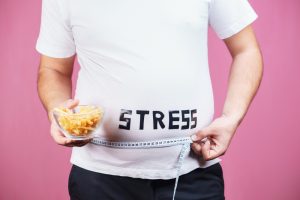Stress can cause many adverse reactions. While stress causes many internal reactions in the fight or flight response, it can also cause adverse reactions in how one copes with stress. One adverse reaction and bad coping method is eating. Many individuals will take consolation in food or late night binges to overcome anxiety and stress. This not only compounds the issues that arise with chronic stress but also leads to poor diet choices and weight gain. Bad sugar and cholesterol choices are also a result of spur of the moment stress eating. Other forms of Stress Management need to be implemented to reduce stress induced eating.

The article, “Why You Stress Eat and How To Stop” from the the Cleveland Clinic takes a closer look at the problems that come with stress induced eating. The article discusses why individuals stress eat but also looks at methods to better control. The article lists other stress relief models but also cognitive responses to help distract one from stress induced eating. The article states,
“If stress eating doesn’t actually improve your stress levels, what does? It goes back to the stress itself. “Stress eating is about escaping your feelings, pushing them away,” Dr. Albers explains, “so the key to getting a handle on it is understanding your stress better.” But with intentionality and effort, you can break the habit and form new ones in its place. “Forming new habits in response to stress takes time, but it is possible,” she adds.”
“Why You Stress Eat and How To Stop”. HealthEssentials. January 26th, 2023. Cleveland Clinic
To read the entire article, please click here
Commentary
Stress can push individuals to eating when they should not be eating. Whether late or night or something bad for one’s diet, stress eating can become a large issue. Stress Management Specialists can help individuals find better ways to manage stress and avoid stress induced eating.
Stress has been studied extensively and is known to have a significant effect on one’s eating habits. It has been postulated that when exposed to a stressful situation, individuals are more likely to engage in unhealthy eating habits due to the psychological response of increased cortisol levels and decreased serotonin levels. This can result in an increase in food-seeking behavior and an increase in the consumption of unhealthy, high-calorie foods which could lead to weight gain. In particular, individuals under chronic stress often engage in binge eating, which is characterized by an increased amount of food intake over short periods of time and involves episodes of elevated emotions such as guilt or shame following the episode.
People who are under persistent stress may seek out food as a coping mechanism. This phenomenon is likely a result of the body’s physiological response to stress, which includes elevated levels of cortisol, a hormone linked to appetite stimulation. Additionally, other hormones released during periods of stress such as ghrelin can further induce hunger. This may be accompanied by an emotional craving for comfort foods that are seen as providing psychological nourishment or solace in times of distress. Intermittent periods of psychological stress can also result in an increase in the activation of the hypothalamic-pituitary-adrenal axis, leading to increased cortisol secretion. This can cause activation of hedonic pathways and reward centers in the brain, resulting in an increased drive for consumption of palatable food items. Furthermore, individuals who are stressed may also exhibit maladaptive coping strategies which involve the consumption of food as a form of emotional regulation.
Stress Management and Eating

In order to cope with stress eating, it is pertinent to alter one’s cognitive appraisals of stressors, develop a repertoire of coping skills, and cultivate an awareness of one’s emotional state. This can be achieved through various cognitive-behavioral techniques such as mindfulness meditation and exposure to positive stimuli. Additionally, refraining from calorie-dense snacks and substituting them with healthier alternatives can also reduce the prevalence of stress eating. While overeating may be an effective short-term solution, it is not the only available option for managing feelings of anxiety. Other means of dealing with stressful situations include cognitive reframing, mindfulness meditation, and diaphragmatic breathing. Cognitive reframing involves actively shifting one’s perspective in order to gain insight into their underlying thought patterns.
Conclusion
In conclusion, stress eating is a common response to feeling overwhelmed or anxious. It is important to recognize when this type of behavior is happening so that steps can be taken to address it. Managing stress in healthy ways, such as exercise, can help reduce the likelihood of stress eating. Additionally, having a support system and being mindful of your emotions can help you make healthier choices. Avoiding unhealthy coping mechanisms like stress eating will help us maintain a healthy relationship with food and avoid feeling guilty or ashamed. Finally, if you find yourself turning to food for comfort more than usual, it may be time to seek professional help. Many counselors who specialize in Stress Management Consulting can help an individual better cope and find alternative ways to deal with stress instead of eating.

Please also review AIHCP’s Stress Management Consulting Program and see if it meets your academic and professional goals. The program is online and independent study and open to qualified professionals seeking a four year certification in Stress Management Consulting.
Additional Resources
“Tips to Manage Stress Eating”. Erin Gager. John Hopkins Medicine. Access here
“Why stress causes people to overeat”. Harvard Medical School. February 15th, 2021. Access here
“Weight loss: Gain control of emotional eating”. Mayo Clinic Staff. December 2nd, 2022. Access here
“13 Ways to Prevent Stress Eating When You’re Stuck at Home”. Jillian Kubala. March 27th, 2020. Access here
“Here’s Why You Stress Eat — And How to Stop Doing It”. Jamie Ducharme. July 31st, 2018. Access here

